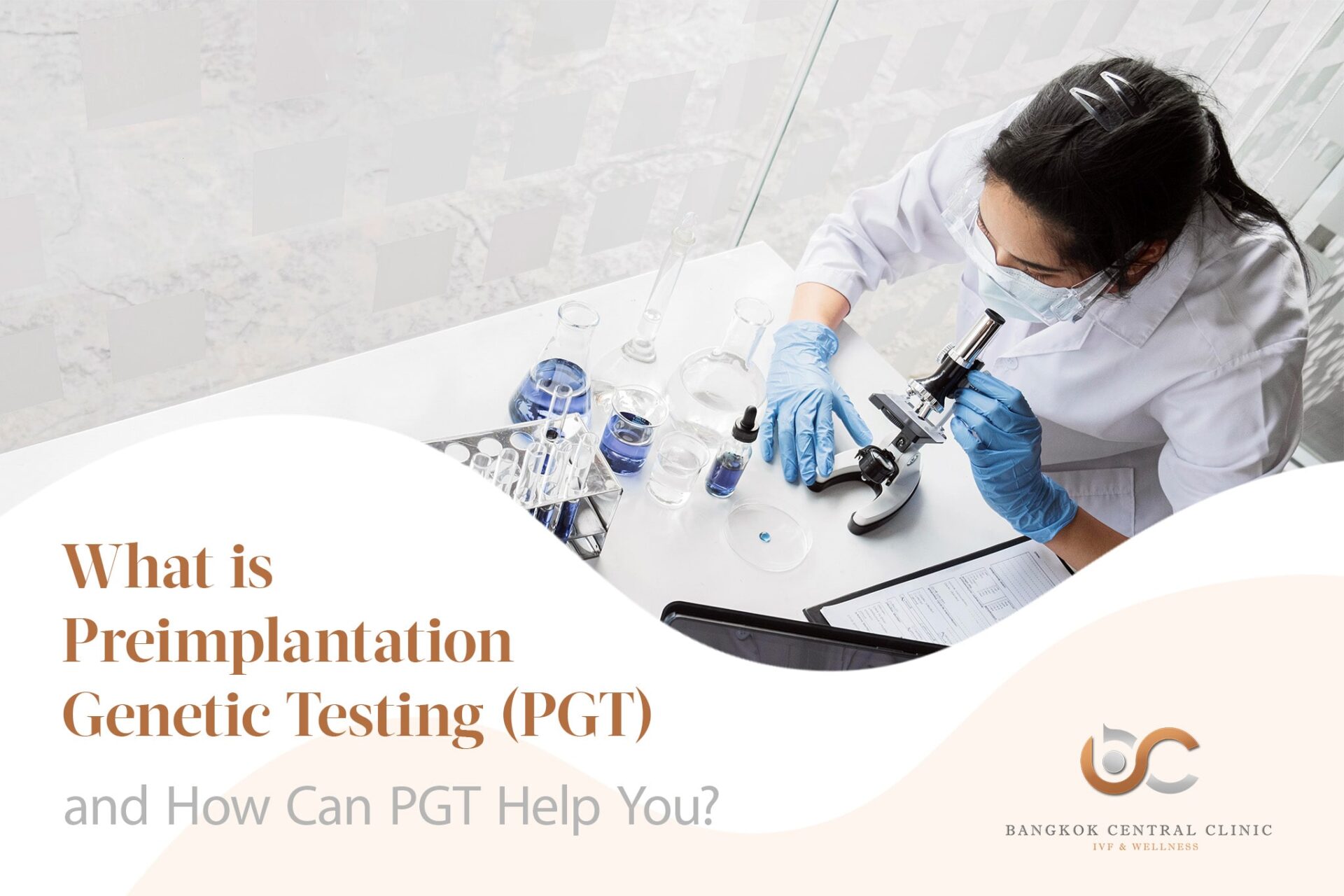HIGHLIGHTS
20 December 2020
5 yoga poses for couples to Enhance your relationship with your partner, level up your happiness in bed.
READ MORE20 December 2020
7 the procedure takes care of yourself and the wife before collecting eggs-collecting sperm.
READ MORE20 December 2020
Protein, a key nutrient of a woman, preparation for pregnancy- preparation for an egg collection.
READ MORE
Why Is It Important for a Health Check Up for Both Male and Female Before Getting Pregnant?
READ MORE
Destination IVF: Why Bangkok is a Premier Choice for International Patients Seeking Fertility Treatment
READ MOREWhat is Preimplantation Genetic Testing (PGT) and How Can PGT Help You?
 29 Feb 2024
29 Feb 2024

Considering the sophisticated nature of treatments like Preimplantation Genetic Testing (PGT), organizing your reproductive treatment might feel like traversing unfamiliar seas. But once you know what to look for, you will have the knowledge to explore with confidence how PGT might reduce genetic risks and increase your chances of getting pregnant. We will share our expertise on the subject in this post, and if you have any further questions, please don’t hesitate to get in touch with our fertility clinic in Thailand.
Table of Contents
What are the Benefits of Preimplantation Genetic Testing?
One essential element in the area of In vitro fertilization (IVF) is preimplantation genetic testing, or PGT as it is sometimes shortened. By giving potential parents knowledge about the genetic composition of embryos before implantation, this innovative treatment maximizes the chances of a successful pregnancy.
PGT is a very useful tool for people who are worried about perhaps passing on genetic disorders to their children. Preimplantation Genetic Testing for Monogenic Disorders (PGT-M) is a specific type of PGT that provides a customized method of genetic screening. Whether it’s cystic fibrosis or other genetic disorders, PGT-M gives families the information they need to make sensible choices and create a healthy future.
What is PGT and How Does it Work: From Consultation to Transfer
Starting the PGT process requires thoughtful consideration and direction from experienced fertility experts. Talking openly and honestly with your doctor about whether PGT fits your reproductive objectives is the first step. The foundation is provided by genetic counseling, which gives you a comprehensive understanding of the advantages and drawbacks of PGT and equips you to make wise decisions.
Embracing PGT is a carefully orchestrated process. Following an IVF cycle to retrieve eggs and create embryos, the next step is embryo biopsy. Here, a select few cells are delicately removed for genetic analysis, which allows for informed decision-making. Meanwhile, your embryos are preserved until PGT results become available. Armed with this knowledge, you and your physician can strategize the optimal path forward, which means making a frozen embryo transfer tailored to your unique circumstances.
Are You a Candidate for PGT?
PGT offers advantages to a wide range of people, each with unique circumstances and goals in mind. PGT is ideal for a wide range of situations. Women over 37, couples worried about hereditary disorders, and those with a history of repeated miscarriages due to chromosomal abnormalities are just a few examples of ideal candidates. Through embracing PGT and its transformational potential, you can move towards a future characterized by empowered decision-making and well-informed family planning.
PGT as a Pathway to Informed Family Planning
In order to make informed decisions regarding assisted reproduction, Preimplantation Genetic Testing represents an opportunity for many couples, offering a pathway to informed family planning and empowered decision-making. Contact our fertility clinic in Thailand for more information about the transformative potential of PGT.
FAQ
Q: What is Preimplantation Genetic Testing (PGT)?
A: Preimplantation Genetic Testing, or PGT, is an innovative procedure utilized in in vitro fertilization (IVF) treatments. It involves the genetic analysis of embryos before implantation to provide potential parents with valuable information about the genetic makeup of the embryos.
Q: What types of Preimplantation Genetic Testing are available?
A: There are different types of PGT, including Preimplantation Genetic Testing for Monogenic Disorders (PGT-M), which focuses on screening for specific genetic disorders such as cystic fibrosis. PGT-M allows families to make informed decisions about their reproductive options and create a healthier future.
Q: How does the PGT process work?
A: The PGT process typically begins with a consultation with fertility experts to determine if PGT aligns with your reproductive goals. After an IVF cycle to retrieve eggs and create embryos, a biopsy is performed to extract a few cells from the embryos for genetic analysis. The embryos are then preserved while awaiting PGT results. Based on the results, a customized treatment plan, including frozen embryo transfer, can be devised.
Q: Who are suitable candidates for PGT?
A: PGT can benefit a wide range of individuals, including women over 37, couples concerned about hereditary disorders, and those with a history of recurrent miscarriages due to chromosomal abnormalities. It provides an opportunity for informed family planning and empowered decision-making in assisted reproduction.
HIGHLIGHTS
20 December 2020
5 yoga poses for couples to Enhance your relationship with your partner, level up your happiness in bed.
READ MORE20 December 2020
7 the procedure takes care of yourself and the wife before collecting eggs-collecting sperm.
READ MORE20 December 2020
Protein, a key nutrient of a woman, preparation for pregnancy- preparation for an egg collection.
READ MORE
Why Is It Important for a Health Check Up for Both Male and Female Before Getting Pregnant?
READ MORE


















